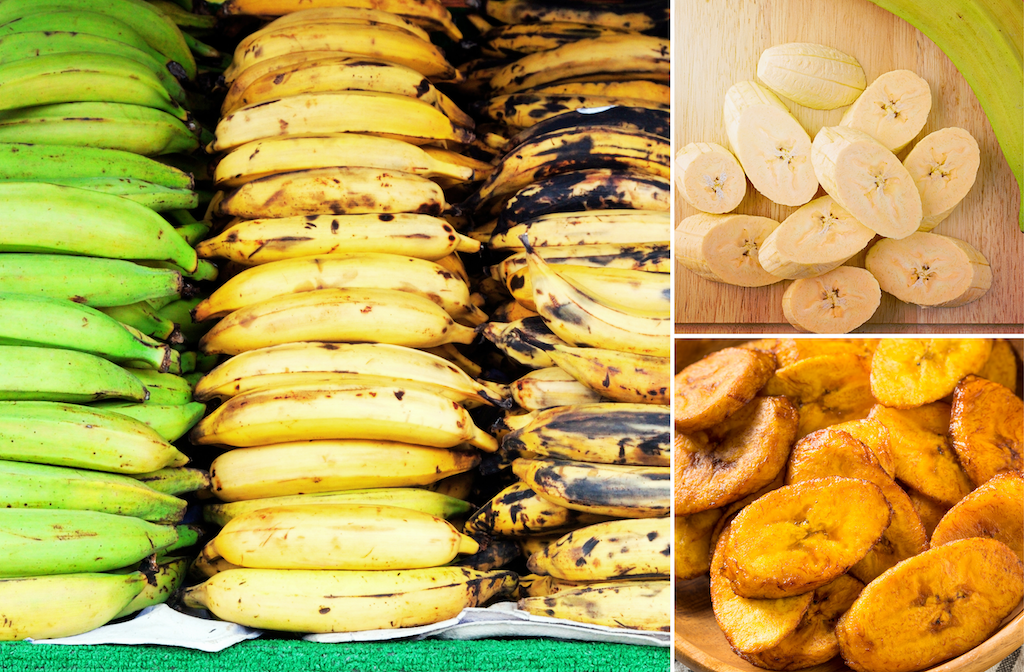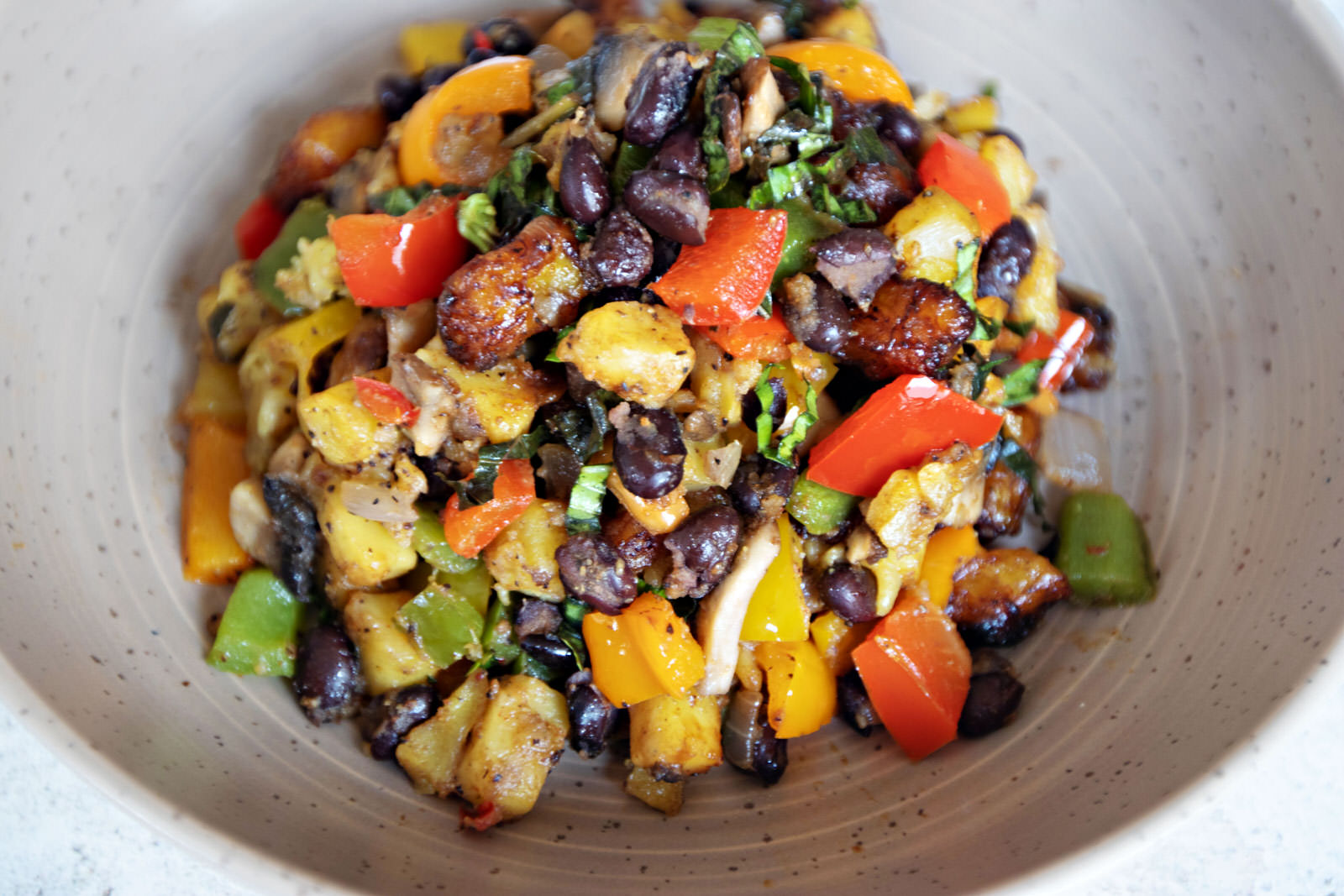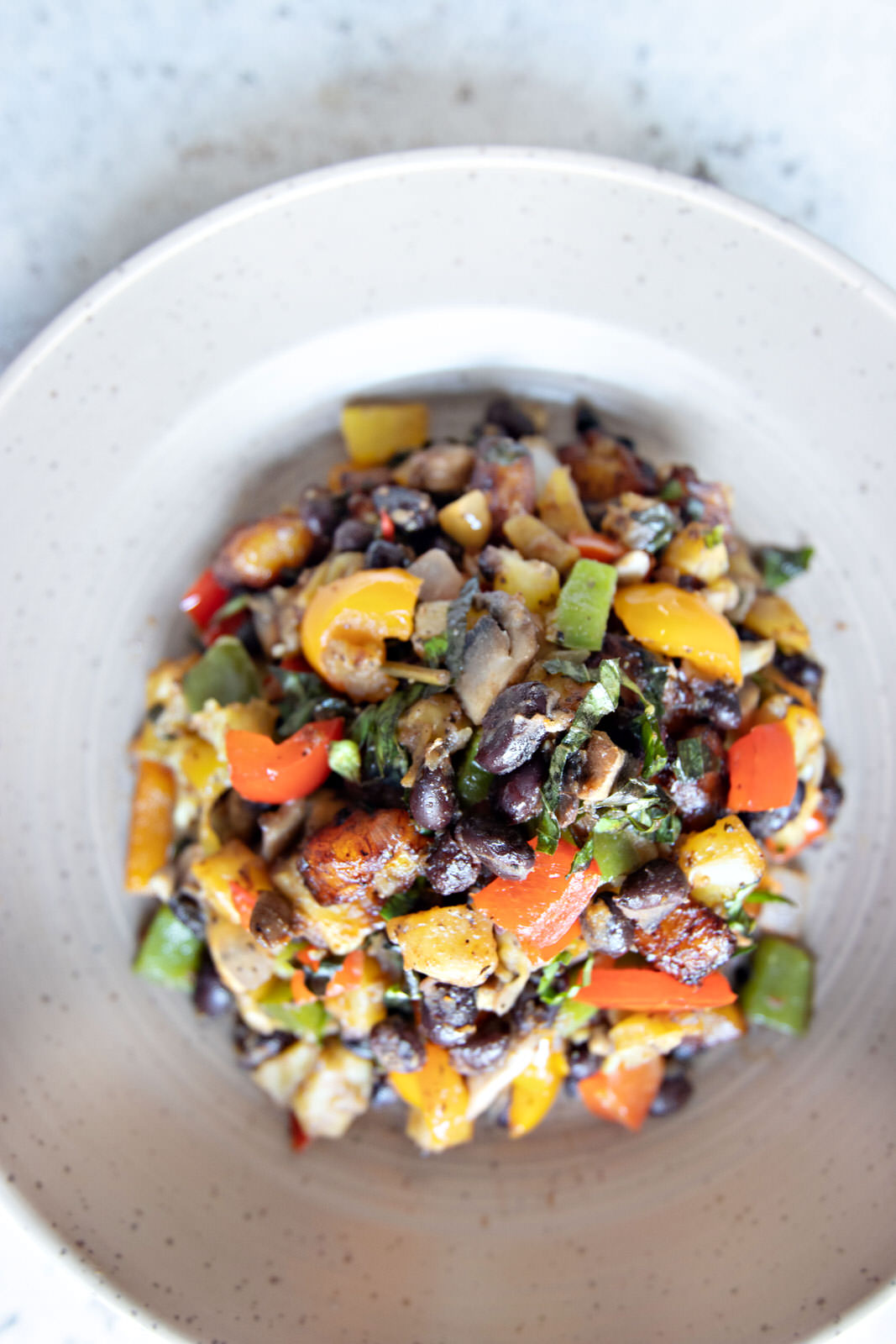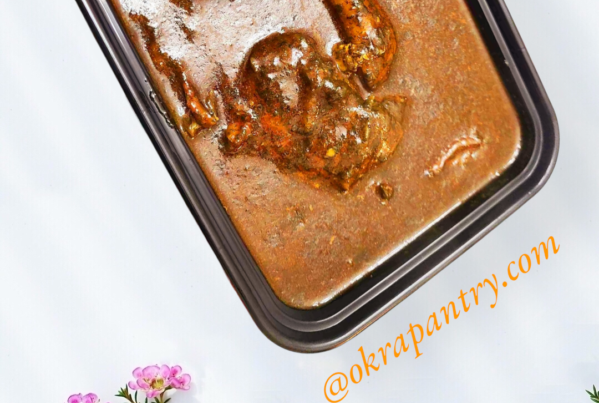25
What better way to start your day than with a vibrant Nigerian plantain recipe? Specifically a ripe plantain and potato hash. Plantains are a staple food in many West African and Caribbean homes, and for good reason. Uses of this versatile starchy fruit (yes fruit!) abound across the range of its ripeness; from unripe to overripe, offering a range of sweet and savory applications. This vibrant Nigerian Plantain and Potato Breakfast Hash puts the spotlight on the hearty goodness of ripe plantains. This super easy to make flavorful dish is perfect for a satisfying start to your day, as breakfast or brunch, but it’s also versatile enough to be enjoyed as any meal.
First of all, Plantains vs. Bananas: What’s the Difference?
Plantains are often mistaken for bananas, but there are some key differences between these two tropical fruits. Plantains are generally larger and starchier than bananas, with thicker skin that’s typically green or brown even when ripe. Unlike the sweet flavor of a ripe banana, plantains have a more neutral flavor profile that leans towards savory when cooked. This makes them perfect for savory dishes like this breakfast hash. Also, plantains are not eaten raw. Yes! They must be cooked. Depending on their stage of ripeness they are great for boiling, frying, or roasting/baking.
A Spectrum of Cooking Options Across Stages of Ripeness
The beauty of plantains is their versatility at different stages of ripeness. Green plantains, with their firm texture and neutral flavor, are excellent for frying or boiling. As they ripen, their skin turns yellow or black, and their flesh becomes softer and sweeter. Ripe plantains are great for baking or mashing, adding a natural sweetness to your dish.
In this plantain and potato hash recipe, we’ll be using ripe plantains for a touch of sweetness that complements the savory potatoes and vegetables. But feel free to experiment! Green plantains can be used for a starchier base, while very ripe plantains will add a caramelized sweetness to the hash.

Let’s Cook This Plantain Recipe
The beauty of a recipe lies in its adaptability! While our Nigerian Plantain and Potato Hash boasts a delicious combination of ingredients, feel free to get creative and substitute some based on your preferences or what you have on hand. Here’s a breakdown of the highlighted ingredients and some potential swaps.

The ingredients you need for your Plantain and Potato Hash
Ripe or Overripe Plantain: The star of the show! As mentioned before, ripe plantains offer a touch of sweetness that complements the savory ingredients. But feel free to experiment! Green plantains can be used for a starchier base, while very ripe or overripe plantains will add a caramelized sweetness to the hash.
Yukon Gold Potatoes: (sub Sweet Potatoes): Yukon Gold potatoes are a great choice for this hash as they provide a fluffy yet slightly firm texture. However, sweet potatoes add a touch of natural sweetness and beta-carotene, making them a fantastic alternative. You can even use a combination of both for a textural and flavor contrast.
Cremini Mushrooms: Cremini mushrooms are versatile and add an earthy umami flavor to the hash. You can easily substitute them with other varieties like white button mushrooms, chopped portobello mushrooms, or even a mix.
Black Beans: Black beans offer protein and fiber to the dish. However, you can substitute them with kidney beans, pinto beans, or even chickpeas for a different twist. Each bean variety brings its own unique flavor and texture to the table. Definitely experiment.
Purple Onions (sub: yellow onion): Purple onions add a mild sweetness and a beautiful pop of color to the hash. However, feel free to use a regular yellow onion if that’s what you have on hand. Yellow onions are slightly sharper in flavor, but still work in this recipe.
Mix of Bell Peppers: Red, green, yellow and orange bell peppers add vibrant color to the hash.
Habanero Peppers: Add as much heat as you desire to the hash. For a milder heat jalapeño peppers are a great option. You can also skip the heat completely if you desire
Neutral Oil: Avocado oil is a great option for this recipe. Using a neutral oil ensures the flavors from the ingredients come through
Spices: In this version the spices were kept simple using only dried thyme, black pepper, and sea salt
Bonus Tip:
To customize this plantain and potato hash recipe even further, consider adding other chopped vegetables like chopped broccoli florets, corn, or shredded zucchini to the mix.
How to make this plantain and potato hash recipe
Step 1. Prep: Peel and dice the plantains, potatoes, onions, bell peppers, and habanero pepper (use jalapeno for a milder heat).
Tip: If your plantains are very ripe, they may be delicate to handle. To prevent them from becoming mushy, try dicing them just before cooking.
Step 2. Cooking the Plantains: Heat oil in a large skillet or pan over medium heat. Add the diced plantains and fry them until golden brown. Drain the excess oil using paper towels. Alternatively, prepare them in an airfryer
Step 3. Boiling the Potatoes: In a separate pot, boil the diced potatoes until tender (approximately 10 minutes) when pierced with a fork. Drain the water and set the potatoes aside.
Step 4. Sautéing the Aromatics and Vegetables: Heat the remaining oil in your skillet over medium heat. Add the diced onions and sauté them until softened and translucent. Approximately about 2 minutes.
Step 5. Building the Hash: Add the bell peppers and habanero (or jalapeño) to the pan and cook for an additional 2 minutes. Then, add the cooked potatoes and the black beans. Stir everything together to combine.
Step 6. Seasoning and Finishing Touches: Sprinkle the dried thyme, black pepper, and sea salt to taste. Sauté everything for an additional 2-3 minutes, allowing the flavors to come together. Finally, fold in the fried plantains and remove the pan from heat.
Serving Up Sunshine: Enjoy! Plate your Nigerian Plantain and Potato Hash and savor the combination of textures and flavors. This dish is delicious on its own, but you can also enjoy it with a side of avocado slices.
Additional Tips and Variations
- Don’t have black beans? No problem! You can substitute them with kidney beans, pinto beans, or even chickpeas for a different twist.
- To add a smoky flavor to the recipe, add a teaspoon of smoked paprika along with the other spices.
- Leftovers can be stored in an airtight container in the refrigerator for up to 3 days. Reheat in a skillet over medium heat until warmed through.











